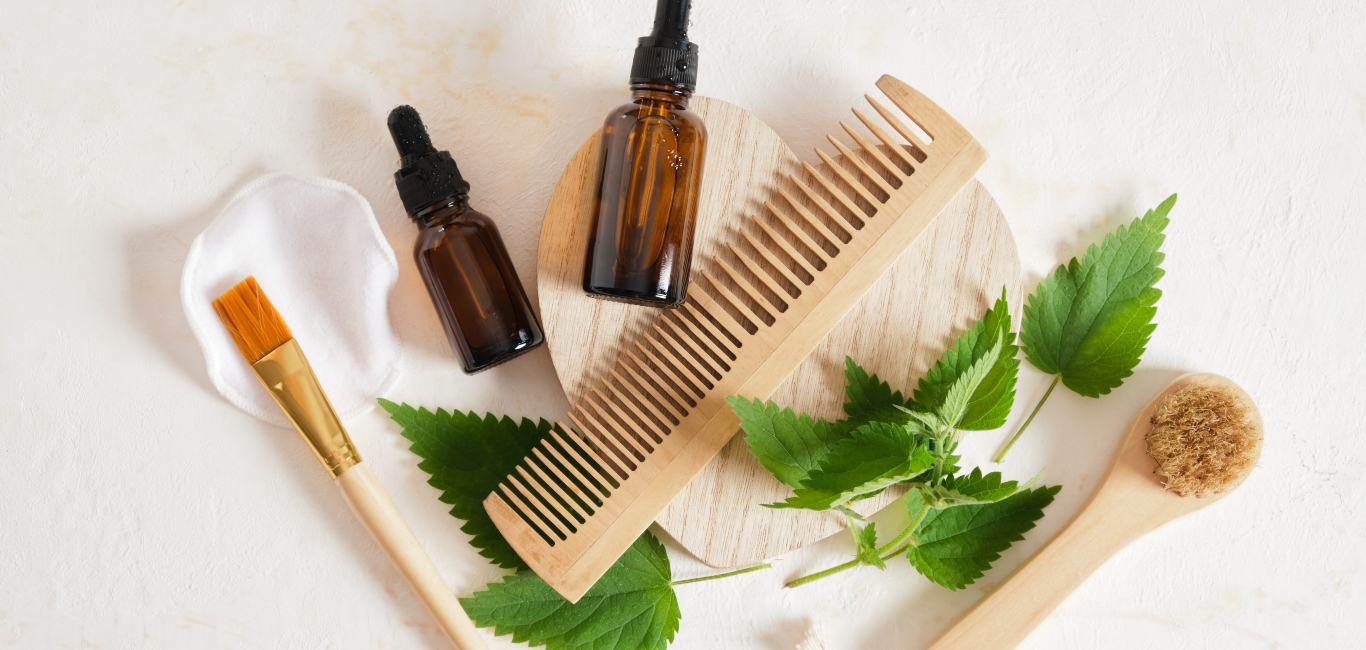
Akhila Das, 21, a college student from Thrissur, Kerala, vouches for a simple yet consistent hair care regimen as the secret to her healthy and long hair. She prefers homemade coconut oil infused with bhringaraj herb for head massages.
“I opt for homemade meals, including a variety of vegetables and fruits, especially green leafy vegetables,” she says. “I may only need a few minutes for my hair care routine, but I make an extra effort to consistently maintain this habit.”
The old question of `nature or nurture?’ probably applies to hair, too. What our genes probably do not provide on top of our crowns could be remedied to an extent with a mix of good nutrition, nurturing habits and some regular pampering for the tresses.
Ayurvedic hair care regime
Along with other factors, hair is also an important indicator of overall health. “Proper hair care does not involve only tending to your hair. It is also about caring for your overall well-being,” says Dr Nilkanth Maradia of Jamnagar, Gujarat, who formulates ayurvedic oil for skin and hair.
Ayurveda experts link healthy hair to balanced doshas and dhatus. “Common causes of hair loss include lifestyle choices, stress, anaemia, nutritional deficiencies, scalp infections including dandruff, hormonal imbalances, medication and hair treatments like colouring,” says Dr Shamitha K V, chief ayurveda consultant, Revive Dr Shamitha’s Ayurvedic Health and Wellness Centre, Kochi.
Dr Maradia adds that individuals should follow an ayurvedic routine. Thus includes a wholesome diet with all six tastes, maintaining hygiene and physical activities. Following these habits helps with overall well-being and in turn can ensure hair health.
First, a healthy diet
The quest for healthy hair begins with eating nourishing food. “Vitamin gummies, capsules and supplements for promoting hair growth are redundant; a well-balanced diet provides all essential nutrients,” says Dr Maradia. It is essential to tailor hair care routine and eating pattern according to one’s prakriti or body constitution, he adds.
Read here about our unique body constitutions and the dietary choices that align with them.
Dr Maradia says meal timing is equally important so aim for a consistent schedule to prevent hormonal imbalances. In particular, eating spinach, carrots, gooseberry and coconut milk aids hair health. “Try to drink plenty of water,” says Dr Shamitha.
| Include in your daily diet a variety of protein-rich sources and iron-rich options such as sesame seeds; foods abundant in vitamin C. Include whole grains, ghee, dates, raisins, almonds, peanuts, sunflower seeds, walnuts and pecans. Also eat broccoli, lentils, seaweed, organic dairy and pineapple |
Regular massage
“Daily oiling nourishes hair, ensuring its health, strength and shine,” says Dr Maradia. A small-scale 2016 study involving Japanese males has shown that four minutes of scalp massage every day for 24 weeks increased hair growth. “Hair massage helps stimulate blood circulation,” says Dr Shamitha. Medicated ayurvedic oils containing herbs like bacopa [brahmi], black cumin (also known as kalonji and nigella) and bhringaraj work well, she adds.
Dr Maradia recommends the use of simple hair oils such as coconut oil or sesame oil which can suit most users. He advises us to avoid hair oils with complex herbal blends as they may not be necessary. Experts suggest that individuals with underlying health concerns could use medicated hair oils – which are oils infused with herbs.
| Use simple hair oils like pure organic coconut oil, black sesame oil or castor oil for regular scalp massages. |
Herbal hair wash
Washing hair twice or thrice a week is ideal. Dr Maradia also adds that opting for herbal shampoos for cleansing should be preferred. Washing hair twice or thrice a week is ideal. Avoid using very hot water on the hair and instead, prefer lukewarm or cold water, say experts. “Avoid using [shampoos containing] harsh chemicals on your hair. While the [listed] chemicals may seem harmless in the short term, they can be harmful and even carcinogenic in the long run,” says Dr Maradia.
| Boil 2 tablespoons of shikakai soap nut powder, reetha or soapberry and a few hibiscus flowers in half-litre water and leave it overnight. Strain the mixture in the morning. Use this frothy liquid to wash the hair once or twice a week. |
Herbal hair masks
A hair mask or shiro lepa is one of the ayurvedic hair therapies. It helps in nourishing and conditioning the hair and the scalp. Ayurveda experts recommend applying hair masks once a week or every fortnight. Herbs like gooseberry, henna, aloe vera, neem, sandalwood powder and fenugreek can be used to prepare a nutrient-rich hair mask. “Always use freshly prepared hair masks,” says Dr Maradia.
| A hair mask of amla (gooseberry) and bhringaraj is high in antioxidants and enhances the strength and volume of hair. Mix three tablespoons of the powder of dried amla and one teaspoon of bhringaraj powder. Add filtered water to a thin, manageable consistency. Apply this paste from the roots to the tips of your hair, leave it on for 30 minutes, and rinse it thoroughly. |
Manage stress
Hair loss is not just related to food, but to stress and hormonal imbalances too. Dr Shamitha says, “Mindful exercises are effective in reducing stress.” Dr Maradia stresses that an individual should establish emotional stability. This involves engaging in daily yoga practice and meditation, even if it is just for five minutes.
| Have a sound sleep for seven to eight, and also practise meditation, gentle yoga, nadi shodhana pranayama (alternate nostril breathing), gardening or walking outdoors amid fresh air and greenery. |
Ultimately, when we speak of effective hair care, a healthy routine along with yoga, pranayama, nutritious food, sound sleep is the way to go.

















